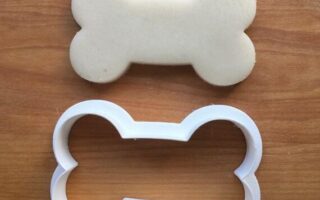In a world where individuality is hailed as the highest virtue, the term “cookie cutter queen” emerges as an intriguing paradox, simultaneously playful and provocative. This phrase encapsulates a phenomenon where conformity to trends and societal norms reigns supreme, often overshadowing personal expression and authenticity. As we navigate through the intricacies of contemporary culture, the cookie cutter queen represents those who master the art of fitting into mold—whether it be in fashion, lifestyle choices, or social behaviors. In this article, we will delve into the essence of the cookie cutter queen, exploring the allure of conformity, the tension between uniqueness and sameness, and the societal pressures that shape this modern archetype. Join us as we unravel the layers of this captivating concept, examining its implications for identity, culture, and the pursuit of belonging in a fast-paced, ever-evolving landscape.
Table of Contents
- Navigating the Cookie Cutter Queen Phenomenon in Modern Society
- Understanding the Impact of Uniformity on Personal Identity
- Strategies for Embracing Authenticity in a Conformist Culture
- Crafting Your Unique Path Amidst the Cookie Cutter Trends
- Q&A
- Key Takeaways
Navigating the Cookie Cutter Queen Phenomenon in Modern Society
In a world increasingly defined by social media and curated aesthetics, the “Cookie Cutter Queen” phenomenon presents both opportunities and challenges. This archetype, characterized by a penchant for assembly-line perfection in lifestyle choices, beauty standards, and aesthetic presentations, highlights the societal pressure to conform. Individuals caught in this cycle often find themselves engaging in a competition for validation through similarities rather than celebrating unique identities. By embracing a checklist mentality, many inadvertently prioritize uniformity over authenticity, leading to a culture where creativity is stifled in favor of mimicking what’s trending.
To combat this trend, a movement in the opposite direction is emerging, championing individualism and self-expression. It encourages people to break free from the mold and showcase their true selves. Key strategies include:
- Embracing Flaws: Celebrating imperfections as part of one’s identity.
- Diversifying Influences: Seeking inspiration from a wide array of sources rather than a singular narrative.
- Valuing Personal Experience: Prioritizing lived experiences over curated perfection.
By shifting focus from the cookie cutter likeness to the rich tapestry of human experiences, society can foster an environment where every individual’s story adds depth to the community. As we engage with various forms of creativity and self-expression, we not only break the cycle of conformity but also empower others to join in the celebration of authenticity.
Understanding the Impact of Uniformity on Personal Identity
In a world shaped by societal norms and conventions, the phenomenon of uniformity curtails the vibrant tapestry of personal identity. Individuals, consciously or unconsciously, often adapt to fit into pre-defined molds, leading to a narrative where creativity is stifled. This adherence to uniform standards can manifest in various aspects of life, including appearance, career choices, and social interactions. When the pressure to conform to a singular ideal becomes overwhelming, we risk losing the essence of what makes us unique. Each person’s story deserves to be told without censorship, echoing the importance of embracing diversity in how we represent ourselves.
Consider the following facets of uniformity and their implications on personal identity:
- Self-Expression: The pressure to conform often results in suppressed voices, where people feel they must mask their true selves.
- Creativity Drought: As uniformity spreads, innovation dwindles, compromising our ability to think outside the box.
- Social Responsibility: The craving for acceptance can lead to complicity in societal standards, erasing critical discourse on identity progression.
To illustrate the contrasts between uniformity and individuality, consider the following table:
| Aspect | Uniformity | Individuality |
|---|---|---|
| Expression | Conformity | Diversity |
| Innovation | Stagnation | Growth |
| Connection | Isolation | Community |
Strategies for Embracing Authenticity in a Conformist Culture
In a world that often pressures individuals to fit molds and meet societal expectations, carving out your own path requires intentionality and courage. One effective approach is to cultivate self-awareness, which can be achieved through practices like journaling or meditation. By taking the time to reflect on your values, passions, and aspirations, you create a clearer understanding of who you truly are. Additionally, surrounding yourself with a supportive community of like-minded individuals can empower you to embrace your uniqueness. Seek out groups or networks that celebrate diversity and encourage authenticity, as they often provide the encouragement needed to resist conformity.
Another strategy lies in practicing vulnerability. Sharing your authentic thoughts and feelings, even in small doses, can foster deeper connections with others and inspire them to do the same. Challenge the norms by engaging in activities that highlight your individuality—this may include pursuing unconventional hobbies or dressing in a way that expresses your true self. Below is a table outlining practical steps to reinforce your commitment to authenticity:
| Action | Goal |
|---|---|
| Journaling your thoughts | Enhance self-awareness |
| Joining diverse community groups | Build supportive networks |
| Sharing personal stories | Encourage vulnerability |
| Exploring new hobbies | Cultivate individuality |
Crafting Your Unique Path Amidst the Cookie Cutter Trends
In a world where trends can shift overnight, it’s easy to feel the pressure to conform to the latest fads and fashions. Yet, the real magic lies in embracing your individuality. Rather than blindly following the popular crowd, take a moment to explore your passions and nurture your talents. While others may opt for the mainstream route, you have the opportunity to carve out a distinctive identity that resonates with your true self. To achieve this, consider the following approaches:
- Reflect on your personal values and interests.
- Seek inspiration from diverse sources, not just what’s trending.
- Experiment with different styles, ideas, and disciplines.
- Embrace your quirks; they are your unique selling points!
Taking a step back to acknowledge the beauty of your individuality can open doors to new opportunities. Establishing a unique path requires courage and resilience, but the rewards are worth the effort. As you embark on this journey, remember that your story is unparalleled, and sharing it can inspire others to break free from their own cookie-cutter molds. Consider creating a visual roadmap to track your evolution:
| Stage | Action | Outcome |
|---|---|---|
| Self-Discovery | Identify passions | Foundation for uniqueness |
| Experimentation | Try new things | Expanded horizons |
| Expression | Share with others | Empowerment and connection |
Q&A
Q&A on the “Cookie Cutter Queen” Phenomenon
Q1: What does the term “Cookie Cutter Queen” refer to?
A: The term “Cookie Cutter Queen” refers to a stereotype often associated with women who embody a specific, homogenous standard of femininity and lifestyle. This includes adhering to conventional beauty and fashion ideals, often reflecting a polished and curated existence that may seem repetitive or formulaic—much like a cookie cutter that shapes identical cookies.
Q2: Where did the term originate?
A: The term has roots in popular culture, particularly social media, where visual representations of lifestyle are often celebrated and critiqued. It gained traction as a way to describe individuals, particularly women who present a highly curated version of themselves online, often emphasizing material possessions, trends, and conformist behaviors.
Q3: Is the “Cookie Cutter Queen” a negative stereotype?
A: While some might see it as a light-hearted label, many perceive the term as derogatory. It can carry connotations of superficiality and a lack of individuality. Critiques often suggest that the “Cookie Cutter Queen” persona undermines authenticity, encouraging conformity rather than celebrating personal diversity and uniqueness.
Q4: What are some common traits of a “Cookie Cutter Queen”?
A: Common traits include a meticulously crafted social media presence, a penchant for trending fashion, and an emphasis on aesthetics over substance. Additionally, the “Cookie Cutter Queen” may prioritize social validation through likes and shares, fostering an image built more on appearances than authentic self-expression.
Q5: How does the “Cookie Cutter Queen” concept relate to social media?
A: Social media plays a pivotal role in the “Cookie Cutter Queen” phenomenon, as platforms like Instagram and TikTok often reward users for visual appeal and conformity to popular trends. This pressure can lead to a cycle where individuals feel they must align their identities with curated ideals, amplifying the cookie-cutter model of personal branding and lifestyle.
Q6: Can the “Cookie Cutter Queen” be seen in a positive light?
A: Some argue that there is a positive aspect to the “Cookie Cutter Queen” concept; it can represent empowerment through aesthetic choice. For some women, curated appearances and a shared visual language create community and a sense of belonging, allowing them to express their identities in a way that feels comfortable and valid.
Q7: How can individuals break free from the ”Cookie Cutter Queen” mold?
A: Breaking free from this mold can involve embracing authenticity and individuality. People can choose to showcase their true selves, interests, and quirks, rather than adhering to societal expectations. Engaging with diverse perspectives, exploring unique hobbies, and prioritizing genuine connections over aesthetic perfection can foster a deeper sense of self beyond the cookie-cutter template.
Q8: what should readers take away from understanding the ”Cookie Cutter Queen”?
A: The “Cookie Cutter Queen” serves as a lens through which we can examine modern femininity, societal expectations, and the influence of social media. Understanding this stereotype encourages a dialogue about individuality, authenticity, and the pressures to conform, inviting readers to reflect on their own identities and choices in a world that often promotes uniformity.
Key Takeaways
As we draw the curtain on our exploration of the “cookie cutter queen,” it becomes evident that this intriguing archetype reflects more than just a simple trend. Whether as a source of inspiration or a cautionary tale, the cookie cutter queen embodies the complexities of conformity and individuality. We find ourselves at a crossroads, where the pursuit of unique expression often collides with societal expectations. In a world eager for the familiar yet drawn to the extraordinary, the cookie cutter queen serves as a mirror, reminding us of the delicate balance between fitting in and standing out. As we navigate our own journeys, may we embrace the rich tapestry of our identities, celebrating the beautiful nuances that make us one-of-a-kind in a sea of sameness. So, let us take this moment to reflect, innovate, and ultimately, break free from the mold—after all, the world is far more vibrant with a splash of individuality.



